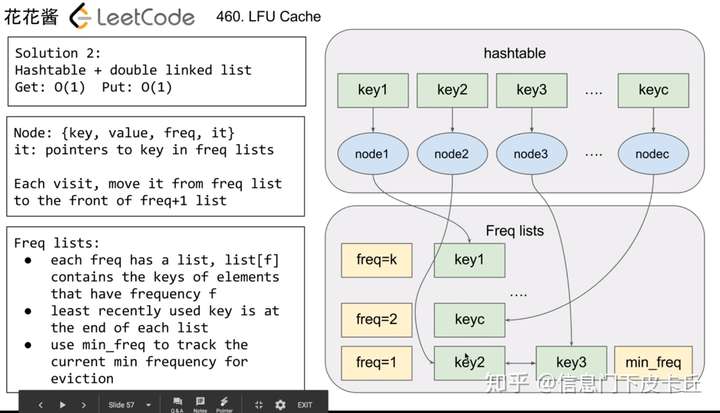460. LFU Cache
https://leetcode.com/problems/lfu-cache/description/

/*
* @lc app=leetcode id=460 lang=cpp
*
* [460] LFU Cache
*
* https://leetcode.com/problems/lfu-cache/description/
*
* algorithms
* Hard (29.73%)
* Likes: 842
* Dislikes: 90
* Total Accepted: 49.1K
* Total Submissions: 161.3K
* Testcase Example: '["LFUCache","put","put","get","put","get","get","put","get","get","get"]\n[[2],[1,1],[2,2],[1],[3,3],[2],[3],[4,4],[1],[3],[4]]'
*
* Design and implement a data structure for Least Frequently Used (LFU) cache.
* It should support the following operations: get and put.
*
* get(key) - Get the value (will always be positive) of the key if the key
* exists in the cache, otherwise return -1.
* put(key, value) - Set or insert the value if the key is not already present.
* When the cache reaches its capacity, it should invalidate the least
* frequently used item before inserting a new item. For the purpose of this
* problem, when there is a tie (i.e., two or more keys that have the same
* frequency), the least recently used key would be evicted.
*
* Note that the number of times an item is used is the number of calls to the
* get and put functions for that item since it was inserted. This number is
* set to zero when the item is removed.
*
*
*
* Follow up:
* Could you do both operations in O(1) time complexity?
*
*
*
* Example:
*
*
* LFUCache cache = new LFUCache( 2 capacity );
*
* cache.put(1, 1);
* cache.put(2, 2);
* cache.get(1); // returns 1
* cache.put(3, 3); // evicts key 2
* cache.get(2); // returns -1 (not found)
* cache.get(3); // returns 3.
* cache.put(4, 4); // evicts key 1.
* cache.get(1); // returns -1 (not found)
* cache.get(3); // returns 3
* cache.get(4); // returns 4
*
*
*
*
*/
// @lc code=start
class LFUCache {
public:
class Node {
public:
int key;
int val;
int freq;
list<int>::const_iterator it;
Node(int k, int v, int f, list<int>::const_iterator i): key(k), val(v), freq(f), it(i) {}
};
int cap, min_freq;
unordered_map<int, Node*> m;
unordered_map<int, list<int>> freqs;
LFUCache(int capacity) {
cap = capacity;
min_freq = 0;
}
void touch(Node *node) {
// update the freq
const int prev_freq = node->freq;
const int freq = ++(node->freq);
// rm the node from old freq list
freqs[prev_freq].erase(node->it);
if (freqs[prev_freq].empty() && prev_freq == min_freq) {
freqs.erase(prev_freq);
++min_freq;
}
// insert the key to the front of the new freq list
freqs[freq].push_front(node->key);
// update the pointer
node->it = freqs[freq].cbegin();
}
int get(int key) {
auto it = m.find(key);
if (it == m.end()) return -1;
touch(it->second);
return it->second->val;
}
void put(int key, int value) {
if (cap == 0) return;
auto it = m.find(key);
if (it != m.cend()) {
it->second->val = value;
touch(it->second);
return;
}
if (m.size() == cap) {
// full, need to remove
// rm from the min_freq list
const int key_to_del = freqs[min_freq].back();
freqs[min_freq].pop_back();
m.erase(key_to_del);
}
min_freq = 1;
freqs[min_freq].push_front(key);
m[key] = new Node(key, value, min_freq, freqs[min_freq].cbegin());
}
};
/**
* Your LFUCache object will be instantiated and called as such:
* LFUCache* obj = new LFUCache(capacity);
* int param_1 = obj->get(key);
* obj->put(key,value);
*/
// @lc code=end
Last updated